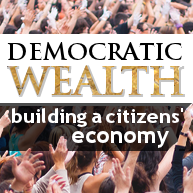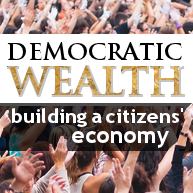
Democratic Wealth
In 2008, when the economic crisis hit, many expected the demise of ‘neoliberalism’ as the reigning economic philosophy. Yet four years on, there are still few alternatives on offer. New citizen movements, such as the indignados in Spain and Occupy movements in London, New York and elsewhere, have articulated a need for an alternative. In this series, we will explore how republicanism – and republicans – might help achieve this.

Democratic wealth: Could republican ideas provide the framework for a new economy?
Call yourself a ‘Republican’ today and people will either think you are a member of the US political party or want to guillotine the Queen. Yet a resurgence of interest in republicanism within academic circles is reclaiming the tradition, while the post-crash political landscape has brought to the fore demands for citizen participation and an interest in sharing control of the economy that can be read as republican in spirit.
An emerging contemporary republicanism within academic circles could provide a framework for building a citizen-led economy. But is there the political will to begin developing this kind of agenda?
In ‘A Discourse on Political Economy’, Jean-Jacques Rousseau gave his take on how a government should tackle inequality: ‘prevent extreme inequalities of fortunes; not by taking wealth from its possessors, but by depriving all men of means to accumulate it; not by building hospitals for the poor, but by securing the citizens from becoming poor’. This is a pretty good definition of today’s buzzword ‘pre-distribution’. Rousseau was a republican who applied these principles to his thinking on the economy, and it is this tradition of economic republicanism that is now being re-examined within academia. Since the first colloquium on the subject was held in Paris in 2007, thinkers across Europe and the US have been furthering the application of republican thinking to the market-driven developed world. Spain, where republican theory was explicitly used as a guide by the Zapatero government in 2004-2011, has provided practical insight in this field, while in the Republic of Ireland, Fintan O’Toole has argued for radical reform to implement genuine republicanism. We might expect American academics such as Michael Sandel, Alex Gourevitch and Thad Williamson, but the renewed interest in academic circles is not limited to republics. In Britain, the work of Phillip Pettit and Quentin Skinner is being read in a new light, towards developing a republicanism that can provide an alternative to market domination.

Democratic Wealth: free e-book on building a citizens’ economy
‘Democratic Wealth’ is a collection of essays that challenges the poverty of thinking around economic policy, particularly after the 2007 financial crash. It explores the renewed interest in republicanism and suggests this as a framework to shape an economy that serves the common good. It is a selection of articles from a series published by openDemocracy and Politics in Spires, a blog run by the universities of Oxford and Cambridge.
The book is split into three parts. The first, Taking Back the Economy, features contributions from Philip Pettit, Thad Williamson, Joe Guinan, Jessica Kimpell and others on republican thinking and the market. The second, Republican Economy in Practice, looks at application around the globe, including contributions on cooperatives, sovereign wealth funds, basic income, tax fairness and green solutions and discusses how to develop these models at scale. In the third, Republican Politics, contributors including Quentin Skinner, Alex Gourevitch and Karma Nabulsi discuss the politics of republicanism, from challenging the surveillance state to democratising the workplace and harnessing the demands of new social movements for freedom from domination by the one per cent. It ends with an afterword by James Meadway, senior economist at nef, on clearing a path for a better future.

If we are to apply it to contemporary politics, which republicanism should we be talking about?
Too narrow an interpretation of republicanism can rob us off many of the tools and insights we should now be employing. This is no time for elite paternalism.
As an intellectual tradition, republicanism is a broad church. J. G. A. Pocock’s seminal charting of a particular part of that tradition, his genealogy of republicanism’s role in Britain’s 13 North American colonies’ struggle for and consolidation of their independence in The Machiavellian Moment, takes in figures as different as Niccolò Machiavelli and Alexander Hamilton.
Any attempt to draw on the republican tradition for contemporary political insight needs to be aware, then, of the variety of thinkers who fall within it and the specificity of the problems they were trying to solve. Often their differences are considerably greater than their similarities, and in failing to appreciate those differences, much of the sophistication and plausibility of the lessons we might learn from the tradition can be lost.

Republicanism and revolutions: a tradition of theory and practice
Republicanism can be explored as a tradition of practices and virtues, tied to the creation of revolutions. At this tradition’s core, and what attaches it through time and place, lies a recurring dominant principle – that of popular sovereignty.
Hannah Arendt, for one, doesn’t think there can be such a tradition of revolutions, because it is a treasure, a public good, which she claims is irrevocably lost between generations. In her The Gap between the Past and the Future, she begins her own quest for the lost treasure of revolutions with the mysteries of its definition:
“The history of revolutions… could be told in parable form as the tale of an age-old treasure which, under the most varied circumstances, appears abruptly, unexpectedly, and disappears again, under different mysterious conditions, as though it were a fata morgana. There exist, indeed, many good reasons to believe that the treasure was never a reality but a mirage, that we deal here not with anything substantial but with an apparition, and the best of these reasons is that the treasure thus far has remained nameless. Does something exist, not in outer space but in the world and the affairs of men on earth, which has not even a name? Unicorns and fairy queens seem to possess more reality than the lost treasure of the revolutions.”

Can democrats learn from Machiavelli?
When politicians are described today as ‘Machiavellian’ the implication is that they are no more than cynical graspers at power for its own sake. Most historians of political thought have long argued that Machiavelli’s own views and politics were more complex than this. In his 2011 book, Machiavellian Democracy (previously reviewed for OurKingdom by Guy Aitchison), the political theorist John P. McCormick offers an innovative reading of Machiavelli. According to McCormick, Machiavelli was not only a republican thinker, but by the standards of his day, and our own, a radically democratic one. Moreover, some of Machiavelli’s ideas, such as his advocacy of plebeian, tribunate institutions, arguably remain relevant to today’s discussions of democratic renewal. Robert Jubb and Stuart White interview John here for the ‘Democratic Wealth’ series.

Liberty, Liberalism and Surveillance: a Q&A with Quentin Skinner
One of England’s most distinguished scholars, Quentin Skinner is a leading historian of political thought and an outstanding advocate of a contemporary republican viewpoint. This interview with Richard Marshall of 3:AM sets out an accessible overview of a lifetime of work. We are grateful to 3:AM for letting us republish it as part of Politics and Spires’ Democractic Wealth series. Open Democracy, our series partner, added at the end two additional questions about corporate power, surveillance and freedom. Skinner’s answer with respect to surveillance is a strong, clear statement of how it is a threat to liberty. This is especially relevant to current affairs given the superficiality of official and in particular British media responses to the Snowden revelations published by the Guardian’s Glenn Greenwald about the programmes of total surveillance being attempted by US and UK secret services.
RM: You are known as a leading historian of political history and in particular the formation of ideas around human liberty. One of the key ideas you’ve written about is what you label ‘neo-Roman’ liberty’. This began back in Ancient Rome didn’t it, where freedom was contrasted with slavery, wasn’t it? Can you tell us what its distinctive traits are?
QS: The vision of personal freedom that interests me is articulated most clearly in the Digest of Roman Law, which is why I have wanted to describe its later manifestations as examples of ‘neo-Roman’ liberty. The fundamental distinction drawn at the outset of the Digest is between the liber homo, the free person, and the servus or slave. The law needed to begin with this contrast because law applies only to free persons, not to slaves. So one crucial question was: what makes a slave? The answer given in the legal texts is that a slave is someone who is in potestate, in the power of a master. The contrast is with someone who is sui iuris, able to act in their own right. Long before these argument were summarised in the legal texts, they had been elaborated by a number of Roman moralists and historians, above all Sallust, Livy and Tacitus. These writers were interested in the broader question of what it means to say of individuals – or even of whole bodies of people – that they have been made to live in the manner of slaves. The answer they give is that, if you are subject to the arbitrary will of anyone else, such that you are dependent on their mere goodwill, then you may be said to be living in servitude, however elevated may be your position in society. So, for example, Tacitus speaks of the servitude of the entire senatorial class under the Emperor Tiberius, so wholly subject were they to his lethal caprice.

Is there a radical politics of virtue?
In today’s commercial republics, the “commercial” and the “republican” seem to be at odds. Commerce generates vast inequalities of wealth; the labor market generates overwork, underemployment, and precariousness; citizens are subject to myriad forms of coercion, surveillance and discipline. Yet a republic is supposed to uphold the freedom and equality of its citizens. Worse yet, the tradition of ‘republican’ political thinking seems to have only extreme answers available to it. In the name of protecting the virtue of its citizens, republicanism has often been hostile to the very idea of commerce. The production and accumulation of wealth, the enjoyment of luxury and leisure, are seen as corrupting private pursuits, drawing citizens away from public life and fracturing any sense of shared commitment to equality and the common good. The only solution is radical regulation. Impose severe restrictions on the production and consumption of wealth, eliminate wealth and poverty, and impose relative uniformity in economic activity. This was the classical republican solution, and neo-republicans have not done much to dislodge this view. As Jessica Kimpell put it in a previous post, “it would seem that contemporary thinkers would be even more vulnerable to this problem than classical republicans.”

Post-growth: a green republican economy
We live in societies with economies nested within them, nested in turn in the non-human world. A green republican conception of political economy recognises this reality, and challenges the priority given to growth.
As Philip Pettit argues in his contribution to this series, republicans see the economy as a politically created arena of human activity, with an associated institutional infrastructure (such as the legal codes, tort, property rights, legal framework for economic enterprises, legal rules governing trade and exchange, etc.). It is neither ‘self-regulating’ or beyond legitimate political and democratic regulation and, where necessary, interference. Republicans do not see a difficulty with interfering with market relations for important non-economic, political reasons, such as to preserve civic freedoms, promote solidarity or shared common goods. They are concerned with ensuring the market is confined to its appropriate sphere, and that the ‘economics imperialism’ and the colonising effects of the market are limited, but without completely abolishing the market.
A green republican conception of political economy, however, is one that also begins its analysis from the observation that we live in societies with economies nested within them. Not the other way around. And both human economies and societies are themselves located within and completely dependent upon the non-human world.









